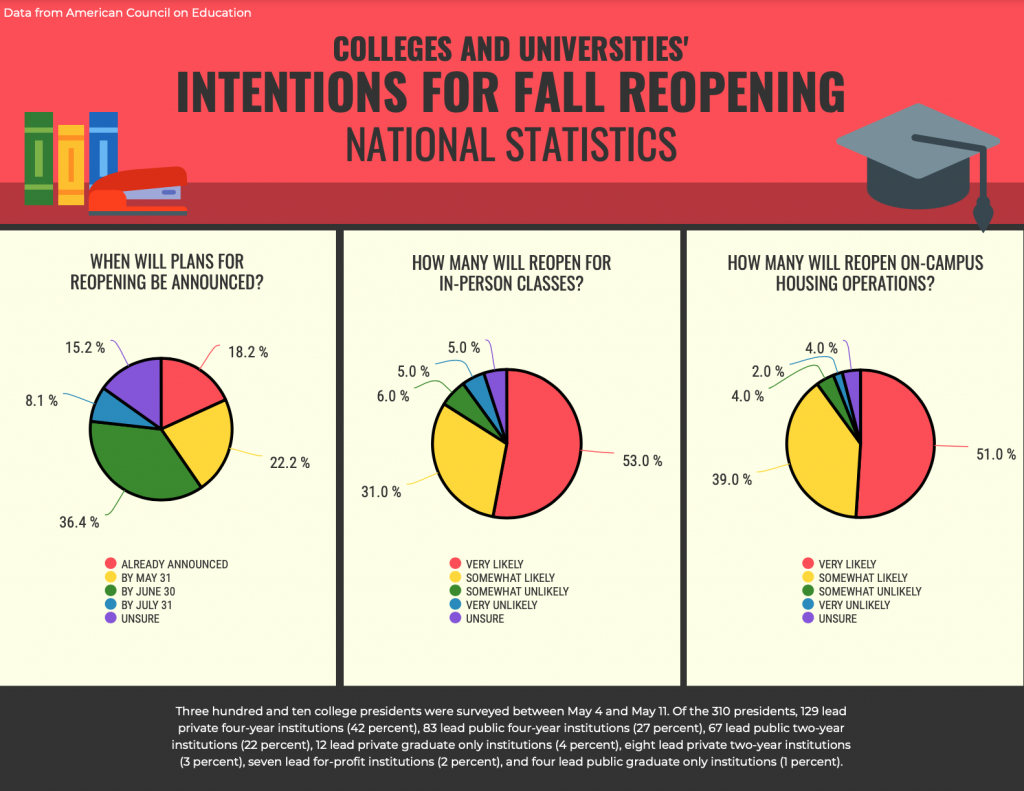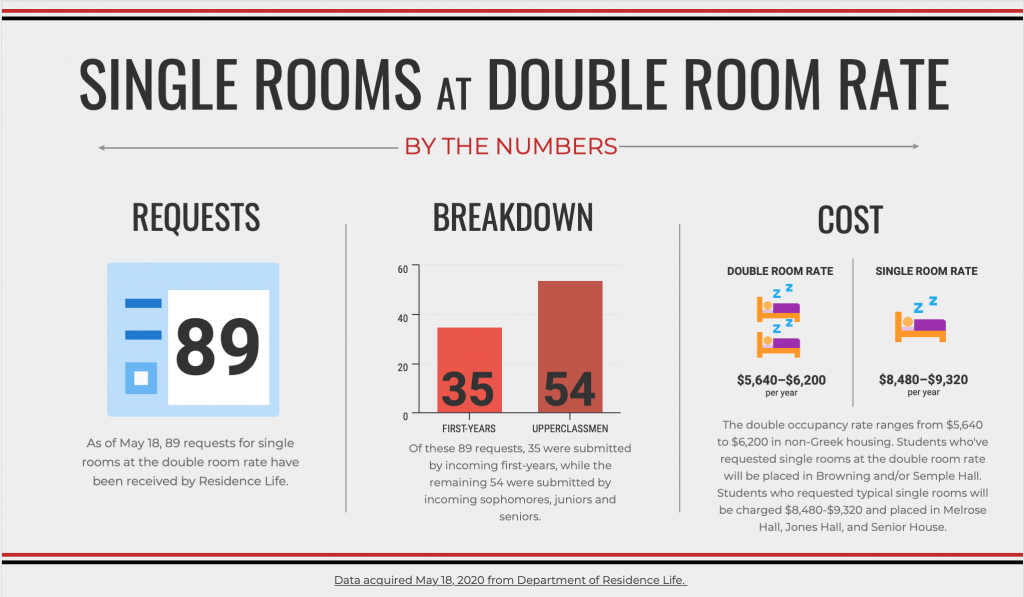In an email sent to the campus community April 23, William Jewell College President Elizabeth MacLeod Walls announced that the College intends to open for the fall semester of 2020 in the wake of the COVID-19 pandemic. This announcement made Jewell among the first colleges and universities in the United States to publicly indicate their intentions to reopen in the fall.
According to the American Council on Education’s survey conducted among 310 college presidents across the United States, only 18 percent of college presidents had announced whether they would reopen in the fall prior to May 4. A further 22 percent of the surveyed college presidents said they would announce their plans by the end of May, with 36 percent following suit by the end of June.
The majority of U.S. college presidents say they are very likely to both reopen for in-person classes and resume on-campus housing operations. Confidence that on-campus housing operations will resume is slightly higher than confidence that in-person classes will occur in the fall. This may be due, in part, to prospective plans to retain virtual classroom platforms or create hybrid learning opportunities that utilize both virtual platforms and in-person teaching to mitigate infection and contact risks while still offering students the convenience of residency on campus.

In a comment given to The Hilltop Monitor, MacLeod Walls said that Jewell could confidently announce its intentions to reopen as early as it did because of its strong networks of resources and facilities that will ensure the health and safety of campus community members when they return to the College.
“We didn’t need to wait because all of the elements to create a safe environment were and are already at hand: A partnership with MRI Global and Liberty Hospital; free testing for all faculty, staff, and students available through Clay County Health; the opportunity to offer single rooms to students who want them (at no extra cost); and the ability this summer to put protocols in place and refit classrooms and common spaces so that we can ensure social distancing and other safe practices in the fall,” Macleod Walls said.
William Jewell has instituted Operation Safe Campus, a strategic threat assessment operation that utilizes guidance from a number of national and local health advisory organizations to gauge what health precautions and safety measures should be enacted on campus in order to mitigate infection risks. Beyond guidance from the Center for Disease Control, Operation Safe Campus has the informational support of MRI Global, a Kansas City-based bio-risk science and research organization, Clay County Health Department and Liberty Hospital.
Daniel Holt, associate vice president for institutional strategy, is the head of Operation Safe Campus. Enumerating the reasons Jewell announced its intentions to reopen as early as it did, he first noted that the College wanted to dispel the discomfort associated with the unknown by being transparent and quick to report its intended next steps.
“Second,” Holt continued, “Jewell is a place that can be nimble and responsive because of our size and the partnerships we have. While guiding an institution can be a lot like steering a ship, things don’t happen instantaneously, we felt that we were capable of getting the word out and be able to get through the summer in a very responsive way to the guidance from the CDC and the Clay County Health Department is providing. And third, but certainly not the final reason, is Clay County has had a relatively low number of cases.”
Holt remarked that even as the county has reopened and eased up on lockdown measures, cases have remained relatively low. As of May 27, there have been 153 cases in Clay County, and more than half of those cases have been released from isolation.
The current condition of the campus is Level B – Moderate. In an email to the College community, Holt wrote that the College is anticipating the condition to remain at Level B into the fall semester. This means social distancing practices, face masks in public settings and the limitation of on-campus gatherings to fewer than 50 people are likely to be mandatory as students, staff and faculty transition back to life on campus. This document includes all of the recommendations and required precautions associated with Threat Level B.
MacLeod Walls was interviewed by Steve Kraske in local news radio station KCUR’s “Up to Date” segment about how Kansas City’s small colleges are faring in the wake of the pandemic. The 13 minute podcast can be found at this link.
In the podcast, MacLeod Walls noted that the College is in a unique position to announce its intentions to reopen due to its small size, saying that, if necessary, the College has the space and facilities to provide each student with their own rooms.
To promote health and safety and accommodate for individual circumstances, the Department of Residence Life sent out a form to the student body April 27 offering single rooms at the lower double room rates within Semple Hall. Residence Life hopes to use Browning Hall as a quarantine facility throughout the year. However, pending the amount of requests for single rooms that come in from incoming first-years over the summer, Browning Hall may be used for the requested single rooms in addition to Semple Hall.
Ernie Stufflebean, director of Residence Life, received 89 total requests for single rooms at the double room rate. Of these 89 requests, 35 were submitted by incoming first-years and 54 were submitted by sophomores, juniors and seniors.

With this unprecedented number of single room occupants, Residence Life is working to devise innovative and efficient ways to prepare a larger than previously expected number of rooms for students during the summer and reorganize the assignment of Residence Life staff members, particularly resident assistants, resident directors and housing managers.
“The most significant impact is preparing rooms for the fall semester. We are actively working with Facilities Management to remove the second set of room furniture from double rooms to accommodate the single rooms,” Stufflebean said. “We have the room inventory to accommodate the number of single rooms requests. Aside from organizing buildings and preparing rooms, the only other significant impact is assignment of Residence Life staff (RD’s, House Managers and RA’s).”
As the College community looks to next year, many are left to wonder when life at the College will reach a new normal. Stufflebean emphasized that the Jewell community must work collectively and embrace the College’s values in order to expedite the process.
“I think life as we knew it prior to spring break in March will not return until a vaccination is developed and widely deployed. Now, more than ever, all members of our campus community must exemplify our institutional values of Authentic Engagement, Courageous Citizenship, Inclusive Communities and Innovative Thought,” Stufflebean said. “It’s going to take everyone working together to adhere to campus health and wellness guidelines such as wearing facial coverings, social distancing, limiting crowd sizes, staying home and in our residence hall room when ill or not feeling well, etc. We will be reliant upon one-another to maintain a healthy campus and minimize COVID-19 exposure.”
